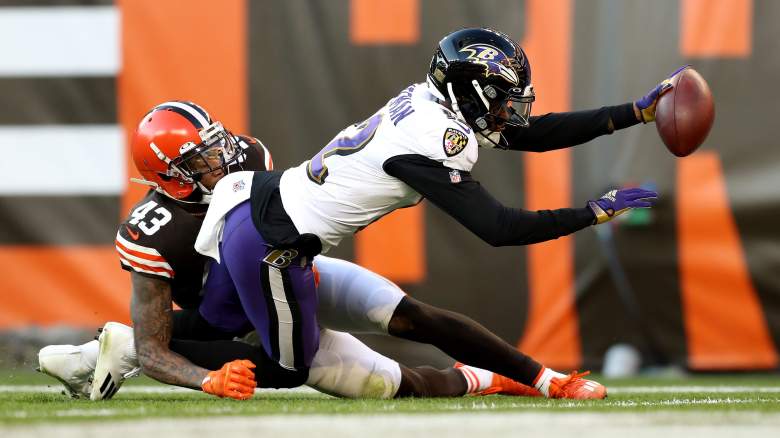
The Baltimore Ravens lost to the Cleveland Browns on December 12 in dramatic fashion, falling just short of completing an 18-point comeback in the second half.
While the Ravens’ comeback attempt ultimately ended with a failed fourth down conversion attempt, some prominent analysts pointed at an earlier decision as the basis for Baltimore’s loss.
After a touchdown by tight end Mark Andrews cut the Browns’ lead to nine points, Ravens head coach John Harbaugh kept his offense on the field to attempt a two-point conversion. If successful, the Ravens would be down by just seven points, but instead they failed, leaving them behind by nine points and in need of two more scores to win the game.
It’s the second week in a row that a failed two-point conversion has sparked controversy in Baltimore, with Week 13’s loss to the Pittsburgh Steelers hinging on a pass from Lamar Jackson that was just barely out of reach for Andrews.
Harbaugh’s decision against the Browns raised eyebrows around the NFL, including those of ex-NFL players and coaches on CBS Sports’ NFL Today.
Ex-Steelers head coach Bill Cowher, who won Super Bowl XL and was recently inducted into the Pro Football Hall of Fame, called the decision “paralysis by analysis,” saying, “We over-analyze things, it’s not that hard.”
Former Buffalo Bills Super Bowl-winning quarterback Phil Simms questioned the decision, blasting Harbaugh’s perceived over-reliance on data analytics to make crucial decisions.
“I want to see the analytics people come up and do the interview after the game. Tell me why you did it,” said Simms.
It’s worth noting, though, that the comments from Simms and Cowher only gained prominence after they were posted with the caption, “This is the worst discussion to ever take place on television.”
Harbaugh Offers Clear Defense of Decision
If Simms had just one minute of extra time, he would get the explanation he’s seeking, as Harbaugh clearly explained his thinking in just 26 seconds after the game on December 12.
The longtime Ravens coach even went so far as to call the attempt “a standard non-decision,” explaining that going for two early gave Baltimore more information on how to approach the rest of the game.
The Ravens could have kicked the early extra point to cut the Browns’ lead to eight points, but suppose they weren’t able to convert the two-point conversion later. Only then, which could be in the game’s last minutes, would they know that they need an additional possession, whereas going for two early gave Harbaugh and his team that crucial information with close to nine minutes remaining in the fourth quarter.
Here are Harbaugh’s full comments, courtesy of the Ravens’ website:
“It’s pretty much a standard non-decision. You do it at that point in time because you’re going to have to win a two-point conversion [at some point]. So, you understand if you get it or won’t get it early, where you’re at and go from there – how many possessions you’re going to need and what you’re going to have to do. If you wait until the last two-point conversion, and you don’t get it, the game’s over. You’ve lost. So, you try it early. We’re in a seven-point game, and we know where we stand. If we don’t get it, we’re in a nine-point game, and we know that we need two possessions.”
Harbaugh lays it out quite clearly: by going for two early, the Ravens found out what they needed to do to win the game.
Other Analysts Back Harbaugh
Despite the criticism from Simms and Cowher, other analysts expressed their support for Harbaugh’s decision.
Steven Ruiz of The Ringer complimented Harbaugh’s explanation of the two-point attempt, adding in a humorous, but effective, comparison for good measure.
Eric Egar of Pro Football Focus broke down the math and logic behind the decision on December 14, centering his argument around a premise similar to Harbaugh’s: “The results of the two-point conversion are unknown until you attempt it, and the earlier you can erase that uncertainty, the better.”
Egar wrote that win probability models supported Harbaugh’s decision as long as the Ravens believed they had an 11% chance (or better) to convert the two-point attempt. Even with star quarterback Lamar Jackson sidelined with an ankle injury, the Ravens’ faith in backup Tyler Huntley’s ability to complete the conversion makes sense. After all, the league-wide two-point conversion rate was 48% in 2019, per Michael David Smith of Pro Football Talk.
But Egar’s description of the “common sense” behind Harbaugh’s decision is even more compelling:
The advantage of knowing the outcome after the first touchdown is that, in the quest for the second touchdown, you already know if you need to kick the onside attempt after (which likely requires some time left to be successful) — or if you can bleed the clock and play for overtime after tying it with a much more successful point-after try.
Harbaugh has demonstrated time and time again that he’s willing to make tough decisions to give his team the best chance to win, regardless of any flak he might take after the game. His leadership through an injury-riddled season should have him in the Coach of the Year conversation, but old-school thinking from the likes of Simms and Cowher could keep him out of the the year-end awards conversation entirely.
Comments
Ex-Super Bowl Winners Blast Another Ravens 2-Point Attempt